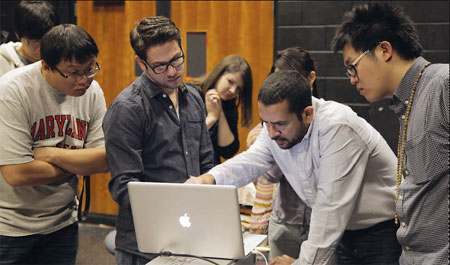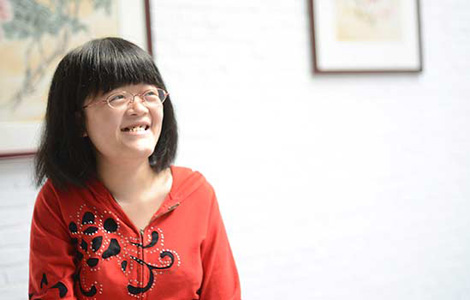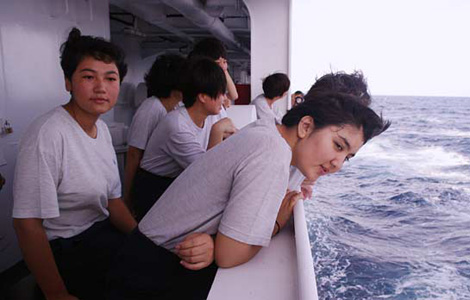Chinese opera looks to the West
Updated: 2013-11-14 08:03
By KELLY CHUNG DAWSON in New York (China Daily USA)
|
||||||||
|
Professors and students from the National Academy of Chinese Theater Arts team up with the University of Maryland's School of Theater to develop a video projection design project. Jared Shaubert / UMD |
Facing declines in viewership and audience interest, Chinese practitioners of Peking Opera are turning to Western theater for inspiration. In continuation of a partnership that began last year with a transcontinental bilingual production of A Midsummer Night's Dream featuring students from China's National Academy of Chinese Theater Arts and the University of Maryland's School of Theater, two professors and a graduate student from NACTA are currently engaged in a month-long crash course in stage management and technology at the American school.
In contrast to Chinese theater, in which the director handles both creative and logistical elements, Western theater delegates the technical aspects of a production to stage managers and technical directors, who free up the director to focus on an artistic vision. More than a functional backdrop to the play itself, lighting and other technical processes are viewed to be an extension of the creative process through which the mood and feeling of a production can be enhanced.
NACTA's delegation, which includes Rui Wang, a professor in lighting design; Xiao Sun, also a professor in lighting design; and Lin Lyu, a graduate student in theater technology at the academy; aim to draw inspiration in hopes of updating Peking Opera practices at home. NACTA's curriculum does not currently include training in stage management.
"There's a big gap between the way things are done in Chinese opera versus the US," Wang said. "Lighting in China is often decorative or functional, but here it's much more about storytelling. That's why we're here; we want to learn tools for more sophisticated storytelling. What we've learned and observed on the trip so far will greatly impact the way we teach when we return to China."
Shadowing professors and attending various educational activities, the visitors have had a chance to participate in the processes that contribute to a Western production. Students in lighting and other technical studies in the US devote time to researching and analyzing plays, discussing design aspects and collaborating in a way that Chinese theater students have not traditionally been encouraged to do, he said.
Cary Gillett, a professor of stage management who has worked closely with the NACTA group on the trip, said that the exchange has provided opportunities for both the Chinese visitors and UMD students to engage in discussion about best practices.
"There has been a lot of interaction and chances to talk about how and why certain technologies are used in both schools, and to trade ideas and generally just see other's ways of doing things," she said. "We've learned a lot from them too."
UMD students have also been inspired by the reverence and respect that Chinese culture pays to Chinese opera, a representative of the university said. American culture is more likely to try new things, but sometimes tradition can be lost in the process, she said.
UMD and NACTA first cemented their relationship with a production of A Midsummer Night's Dream that was staged first in Maryland before traveling to Beijing. The current visit will likely be followed by a trip by UMD professors to China in the coming year, in hopes of furthering a long-term relationship, said Helen Huang, a UMD theater professor and costume designer.
"A Midsummer Night's Dream was such a positive experience that positively impacted us here in Maryland," Huang said. "We really hope to continue the relationship, but a production is not always possible, so these kinds of trips are important."
In the fall of 2014, UMD professors will attend a theater technology symposium in Beijing, featuring NACTA and other Western theater programs including Shanghai's Central Academy of Fine Arts, the Yale School of Drama and London's Academy of Dramatic Arts.
One of the challenges faced by the NACTA delegation has been a lack of English fluency, Gillett said. But using a combination of hand gestures and demonstration, both the Chinese visitors and American students have often been able to seamlessly communicate about various technological processes, she said.
"We can relate to each other based on the work we do," she said. "I've seen a lot of communication happening that way on this trip. We have so many common elements, and can connect on the idea and the fact that at the end of the day, we both create theater. That's what they study, and that's what we study. The organization of the processes might be different, but we're really doing the same thing: We create theater."
Rui, Xiao and Lin will spend Thanksgiving at Huang's home in Maryland, before traveling on to New York to check out all the famous Broadway plays, they said.
"Our time is too short," Lin said. "But it's been great, and the trip has been extremely eye-opening."
Contact the writer at kdawson@chinadailyusa.com
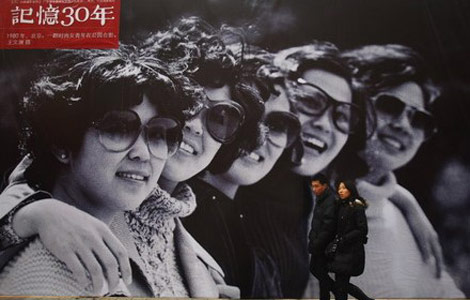
 China's changing fashion since 1978
China's changing fashion since 1978
 Top 10 romantic places to meet your Miss Right
Top 10 romantic places to meet your Miss Right
 Rare bird finds sanctuary
Rare bird finds sanctuary
 Government leaders to be held accountable for school safety
Government leaders to be held accountable for school safety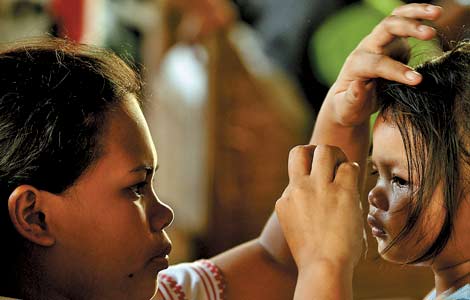
 Deadly looting in Philippines
Deadly looting in Philippines
 Graduation celebration for Santas
Graduation celebration for Santas
 One World Trade Center deemed tallest US skyscraper
One World Trade Center deemed tallest US skyscraper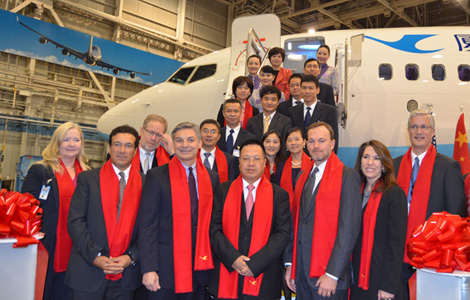
 Xiamen Airlines gets milestone 100th Boeing
Xiamen Airlines gets milestone 100th Boeing
Most Viewed
Editor's Picks

|

|

|

|

|

|
Today's Top News
SAT alternative makes bid for Chinese takers
GM international office moves to Singapore
Leader honored for improving cross-Strait ties
Government leaders accountable for school safety
Banks'nonperforming loans up slightly in Q3
Investment treaty with US offers risks and rewards
Quality growth 'to be achieved'
PLA aims for global connections
US Weekly

|

|
